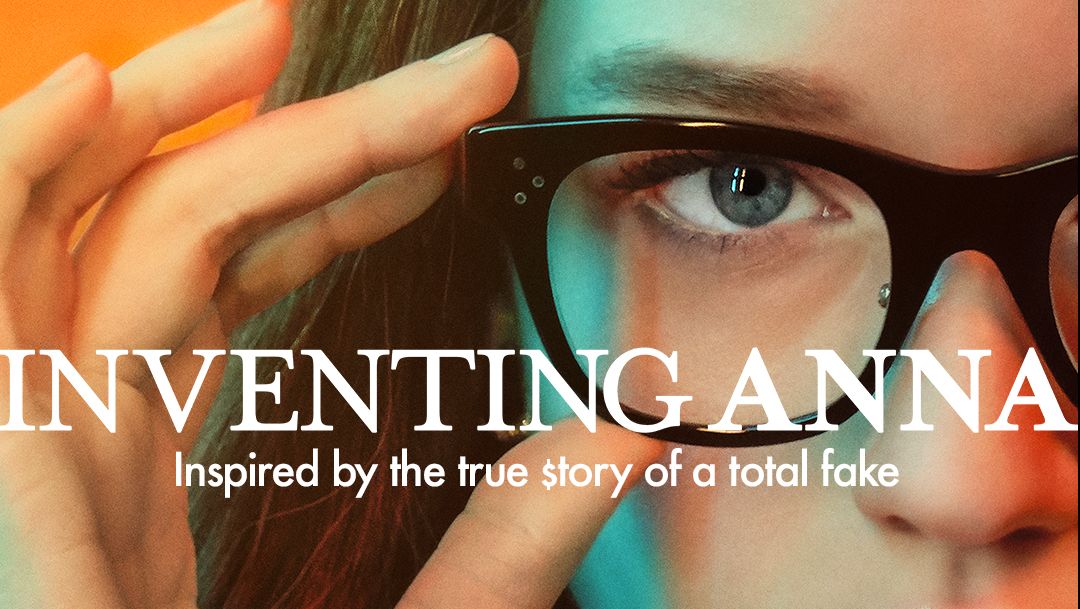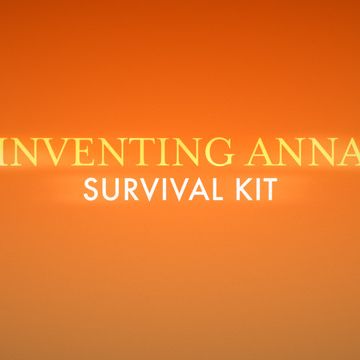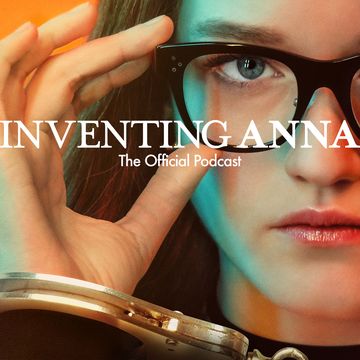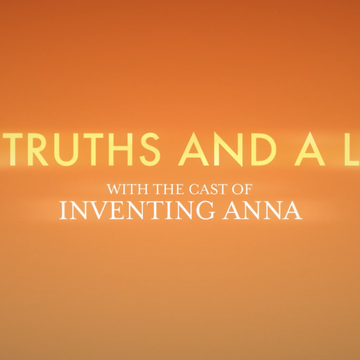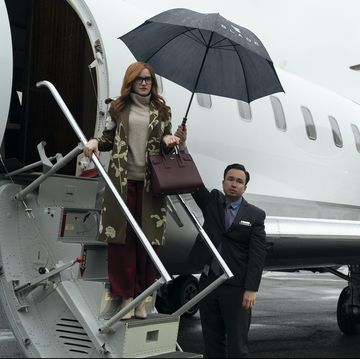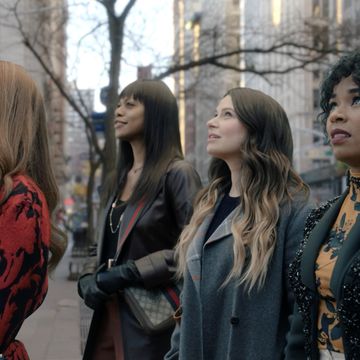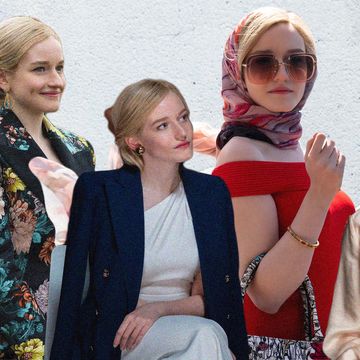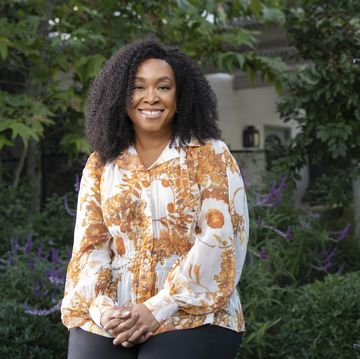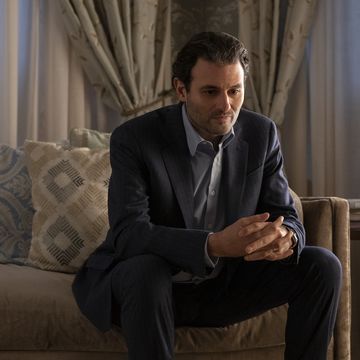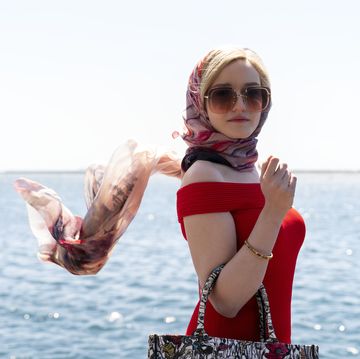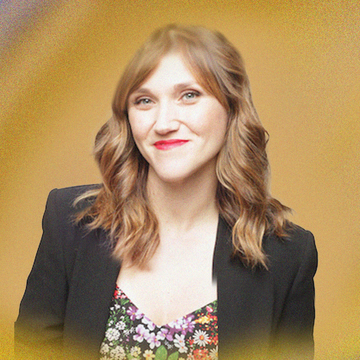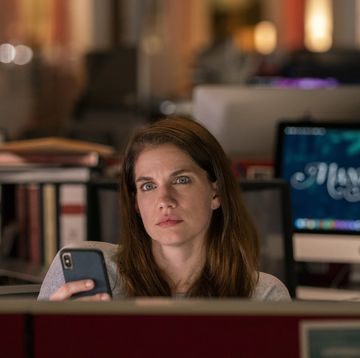Alexis Floyd was working as a concierge at a high-end yoga studio in New York City when she sent in an audition tape to play Neff, the fictional version of Neffatari Davis, a concierge at a swanky hotel where famed New York City grifter Anna Delvey spent an extended period of time — and never paid. When Floyd got the call a few weeks later that Shonda Rhimes wanted to cast her in Inventing Anna, Rhimes’ Netflix limited series exploring the now-infamous story, scams, and swindles of Delvey, Floyd already felt the synergy.
“I knew right away what [playing this character] meant,” says 26-year-old Floyd of the kind of life Neff leads. “How you’re putting out a fire in the corner while making sure your cat is getting fed, while fighting with your boyfriend. I know that juggle well.”
The same could indeed be said for Floyd’s artistic career: She’s an accomplished singer with an EP out, a choreographer who has danced in short films and music videos, and a stage and screen actor with a degree from Carnegie Mellon in musical theater. So, it’s no surprise that it’s Neff’s ambition and dedication to a career outside of that survival job that Floyd relates to most.
“I found a lot of connection with Neff,” Floyd says. “What it’s like to have a dream that some days you only have 15 minutes to cultivate and some weeks you don’t touch it at all. Making space for it when you’re spending so much energy performing in your real life in the service industry — it’s hard to find the energy or motivation to tend to that part of you.”
Floyd was born in Cleveland, Ohio, and grew up with her brother and two parents about 10 minutes from the city center. Though her father is a lawyer by trade, both parents have relationships to the arts: Her mother is a music educator, and her father boasts a beautiful singing voice. Floyd and her brother attended private schools throughout their education, and academics were very important. But she says she and her sibling also had a lot of space and support to explore their creative sides. So, Floyd began playing the violin at age 3. She also danced ballet and ice skated until she found theater as a teen with East Cleveland Community Theater. For her first show, Floyd played Dorothy in The Wiz. That musical would also end up being her last as a senior at Carnegie Mellon, again as Dorothy. After graduating, Floyd tried out Los Angeles and admits that she was surprised to discover she loved the process around filmmaking.
“I loved the way being on set felt, and in particular, I really liked the intimacy of the audience as being this one eye,” she says.
But the pull of New York City was far too strong to let her stay in L.A. for long. She recalls sitting in her room at home in Cleveland looking at Google maps of NYC and zooming in. She adds,“I had so much fantasy about it as a kid. So, when I was feeling like it was time for a little bit of a reimagination of life, I moved to New York. Now I’m here. And I’m not going nowhere. I love this city.”
In September 2019, Floyd sat down with Rhimes and Inventing Anna executive producer Betsy Beers to find out exactly what she was in for. Floyd hadn’t known about Anna Delvey’s story, but a quick Google search gave her more than enough information. And by November, Floyd was filming her first scene with Julia Garner, who plays the show’s lead. Elsewhere in the cast are the likes of Laverne Cox, Katie Lowes, and Anna Chlumsky, but, trust us, by the time you meet Floyd as Neff, her ability to steal (and keep) a scene won’t be lost on you.
As we gear up for the premiere of Inventing Anna on February 11 on Netflix, we sat down with Floyd to get into all the details about the upcoming show, including why Neff is so loyal to Anna, how Floyd won over the producers with her diligent research into Neff’s accent, and the type of person Floyd thinks Anna Delvey really is.
VALENTINA VALENTINI: So, let’s start at the beginning: How did the audition go for you?
ALEXIS FLOYD: I spent most of my time in preparation for the audition diving into as much material as I could about the story. I was excited to see that Neff pops up in the Jessica Pressler article that the show is rooted in as sort of a narrator figure with a lot of firsthand perspectives on Anna. That article helped introduce Anna to the world, so it was a touchstone for me. It was in the character description as well that Neff was sort of our bedrock, our home base. She was where we could come back to to feel grounded in the midst of the whirlwind.
When I did the tape audition, I remember the friend who was helping me was like, “Mmmm” [cocks her head in a disappointing manner], and I was like, “Okay, sure.” And I was a bit sad that maybe this wasn’t going to be the one I got. Then a couple of weeks later, my management called and said that they didn’t need to do a callback or anything, just that Shondaland hadn’t seen my work before, so they just didn’t know who I was and wanted to meet me.
VV: What was that call like?
AF: I remember the thing they were the most curious about was how I was able to discover the sound of Neff. They had sat down with Neffatari Davis, who is a consultant on the show, and they mentioned that I sounded a lot like her. I explained that I saw she was from Prince George’s County, Maryland, and that I was familiar with that dialect; that I knew she’d been living in New York for about 10 years before she met Anna, so I was thinking about the ways Brooklyn might’ve snuck in there. And then if she is working as a concierge, you’re doing a lot of mirroring clientele. And then on top of that — and this is really a testament to the writing — they had used quotes from Pressler’s article in the audition scenes, so I knew that they were really listening to Neff’s speech pattern as well, so I sort of tried to reverse engineer how [her voice] all came together.
VV: Well, I guess it worked! So, when you got the pilot script and read that, what were your initial thoughts about this story and this woman, Anna Delvey?
AF: The whole thing felt almost mythical to me. Like a ghost story told around a campfire with a flashlight under the chin. There is so much conflicting evidence and opinion about her, and I thought the mystery around it was so energetic that it was coming off the page. Even to this day, it doesn’t seem real. The other cool piece was the characters. There were so many people who got caught in the Anna Delvey whirlpool who had their own stories, their own unique relationships to playing the game and doing the hustle and grinding — the New York grind.
It was such a diverse cast of characters she had around her that it was like the story was begging to be realized in a dramatic context. It’s such a cool celebration of how I’ve always sort of felt about New York — it’s this magical place that has its own heartbeat and its own wants and needs. And we all live and breathe and feed off that energy. And sometimes it knocks you on your ass, and sometimes it hands you a miracle. You never really know when you step out onto the street which kind of day it’s going to give you.
VV: The fact that Davis is a consultant on the show, that must have been great to have that kind of access to her.
AF: When I got the job, one of the first things I wanted to do was to get in touch with her. I didn’t know at the time that she was a consultant, but I just knew that I didn’t have all the pieces to do justice to filling in all of her colors and her dimensions. The first time we met, we just really clicked as people. We had dinner for like three and a half hours.
VV: Who paid the bill?
AF: [Laughs.]
VV: Sorry, bad joke!
AF: But it’s timely, girl!
VV: What was that like, getting to talk to her? Getting to interrogate the real person you’re going to play — to a large extent — on TV?
AF: I was so struck by how generous she was with her story. Not just her story around the Anna Delvey story, but she offered so much about who she was. She is a very self-confident person in a very poised way. There’s nothing about it that is performative. She really knows who she is and seems really studied about her own story, which translated into comfort with me and the team to say, “Here I am. This is what made me; this is where I come from.” I was so thankful for that. And also, there was something about her having done the work on herself to know who she was so specifically that she knew her inherent self-worth, which is one of the differences between her and Anna. She’s someone who really knows that her value comes from within.
VV: Do you understand Neff, the character, and her motivations when it comes to putting up with Anna Delvey? Because I think that’s a really tricky thing to watch.
AF: The friendship that is cultivated between them is grounded in something real. They were some of the only people in their universe at that time who really saw the value in one another, who saw the potential, the creativity, the energy, and the self-initiated momentum to make this world their own. Their inventiveness, not to be punny, but they were both women who saw this world as an opportunity despite the limitations put on them. They were unafraid to challenge people’s ideas of who they were or challenge the circumstances that they were born into when they felt like what they had inside was bigger and went beyond prescribed limitations. So, a big part of Neff’s motivation — besides wanting to have resources to tell her own story and make her film — is that she wanted to empower, to sort of hand over the keys to the kingdom that she’s collected by working as a concierge at this hotel to someone who knew how to use them, who was doing their research, who was interested in arts and culture, who had a vision. That’s something that Neff and Anna share, and it was a real part of the joy that Neff found in spending time with Anna. She could have intellectual conversations about the colors and qualities of New York they both loved, and the roles they wanted to play in being major players in the creative space. That felt like a universe that Neff had only been a doorman to for others and not something that she felt like other people saw that she might be able to step through that door too. Like Anna was saying, “You have things to do in this room as well. I want you to come with me because I believe you belong here.”
VV: Do you, Alexis, think that Anna Delvey is guilty? Like, what she did was wrong? And what about you as Neff? Does she believe Anna did anything wrong?
AF: I think Neff leads with empathy for Anna as being a victim to misjudgment. But I also think that Neff maintains a kind of fluidity in terms of how she judges Anna, even in the aftermath. One of the big lessons of the story with Anna for Neff is that knowing the whole of someone is impossibly complex. She’s not necessarily even looking to arrive at that kind of conclusion about who Anna is, or who anyone is. And for myself, what’s clear in a similar way, and that might be bleeding into how I feel too, to be honest, but maybe the only thing that’s clear to me is that in the wake of Anna trying to build this empire, a lot of people were hurt. As much as there were people who lost these more symbolic things, like money and power, there were a lot of people whose trust was broken. Neff being one of them. I really felt that loss in Neff, the character, and I felt the damage that that did to her confidence. I also think Anna is one of her own victims, and I understand that there’s a lot of pain that comes with dishonesty on any scale. The consequences of that are really vibrant in the show, and in the story in general.
VV: But what is Neff’s motivation for being so loyal to a rich, white, privileged woman when clearly Neff comes from a different world?
AF: Right. I think it started as access. She discovered that her relationship to this world has always been more of survival rather than having the opportunity to thrive on the inside of it, and when given the chance through Anna to see the other side of the curtain that she works so hard to cultivate for other people, she sees that she has just as much worth and talent and creative energy as anyone here. Being around Anna becomes more about validating something that Neff feels is true about herself. She’s seeking the kind of confidence and ownership that Anna has of her identity and place in this world. Being around that energy, Neff’s almost studying from the inside what it’s like to hold that kind of space, to be sure of your own presence and value. That’s what motivates Neff to form this working relationship that then turns more emotional with time.
VV: There is this funny thing that kept popping up for me in Neff’s scenes — she is crazy about her work breaks. Like, don’t mess with Neff when she’s on a break!
AF: Do not do it! [Laughs.] I think there are a couple of things going on there. She mentions the union a lot. She is a believer in the power of the people, and in the service space, where she has the opportunity to assert her boundaries and her worth, she will do it. It’s such a huge part of who she is. She has a sense of worth that is troubled and often contradicted by the world outside of her, but she really feels that she is needed in the universe of her hotel. She feels a sense of authority and power in terms of putting on this show for the guests. And she’s not at all — because of the role she plays — naive to the corners that are cut and the games that are played. That is a chess piece that she knows how to play. The subtext is “Do not try to undercut, underplay, underserve me.”
VV: Can you tell me about that first scene you filmed with Julia Garner? You really just got thrown into the deep end!
AF: Yeah, totally. But I loved doing that very first scene with Julia — it was the first time I connected with her. She is one of the most present actors. I mean, like what an instrument, what a craft she has. But, yeah, so that scene is from episode five, where we’re lying in the hotel bed, falling asleep in the morning. I felt like it was such a blessing because we got to do the most intimate, vulnerable stuff first. She almost tells me a lot of her truth in that moment, and I think it’s a testament to what was really real about their friendship and relationship. There is a safety there, a mirroring there that is also part of what motivates Neff so strongly. I don’t know if that is someone who has a ton of emotional closeness in her life. It was a nice way to start the journey of the show, especially with Julia, to start from their gooiest and softest and then see them playing in front of other people and playing in the game, which moves them farther from that center. But that intimacy could then be shared throughout the series with a look, a glance, a laugh. That set the tone for the way the rest was going to feel moving forward.
VV: Now, last but certainly not least — you have an EP, P.E., out, and you are a choreographer and a dancer and a singer-songwriter. You are a multi-hyphenate talent. But is TV where you want to focus yourself now? Or are you trying to just do all of the things all of the time?
AF: I’m not. I’m trying to listen to my heart and be unafraid of taking it one step at a time, letting things come toward me as much as I’m seeking things. But I will say that something that attracts me so much about filmmaking and TV is that it’s a multi-hyphenate space too. There are so many departments and creative presences and creative masters that work to bring a story to life. I always feel the electricity of that on set. It’s an undefined space that takes hundreds, if not thousands, of people to fully realize the story in that world. Like in Shonda’s shows, there’s so much music and choreography. She uses music so meticulously to cultivate the emotional energy of a scene, and same with the choreography in her camera work. There’s a language she’s developed — you see it in Scandal too. So, I want a world where I cultivate all the different ways that making art brings me joy.
VV: Until Shonda comes back and is like, “We’re doing a Neff spinoff, and you’re going to star in it, Alexis.”
AF: Oh, yes! Sign me up. Like where can I sign? I’ll tattoo it on my head.
Valentina Valentini is a London-based entertainment, travel, and food writer and also a Senior Contributor for Shondaland. Elsewhere she has written for Vanity Fair, Vulture, Variety, Thrillist, Heated, and The Washington Post. Her personal essays can be read in the Los Angeles Times, Longreads, and her tangents and general complaints can be seen on Twitter at @ByValentinaV.
Get Shondaland directly in your inbox: SUBSCRIBE TODAY

